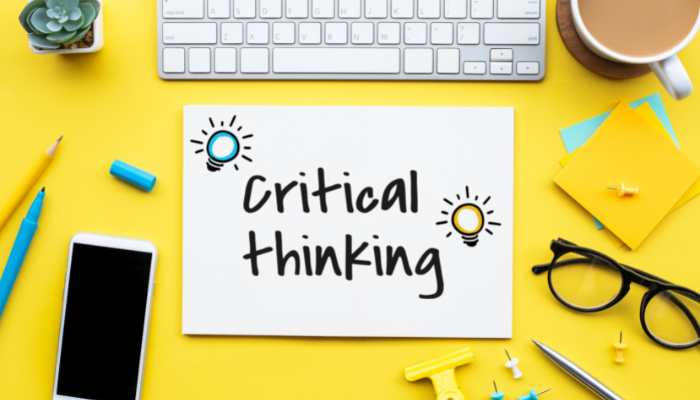Critical thinking is a trait or ability that allows us to analyze, assess and make judgments and opinions on a given topic or statement.
Critical thinking is learning to think for oneself based on our criteria. Still, after a period of reflection, we have assessed all the possible alternatives and, consequently, choose the most rational.
Every day we are faced with decisions; sometimes, we are moved by instinct and routine, and other times, by deep reflection and evaluation of alternatives. Thus, we do not always choose the most optimal, rational, or efficient option.
But what is correct? This is a very difficult question to answer. People can have very different opinions in the same situation, or before the same statement, after a critical and reflective period. It is important not to associate critical thinking with absolute truth.
Is it necessary to reflect on what we do or the choices we make?
The answer is: it depends. A critical appraisal of all our daily actions can lead us to inefficiency since a lot of time is wasted on studying, which is the most rational option. But, an undervaluation can lead us to make decisions that we can pay for in the long run.
That is why critical thinking is usually associated more with transcendental issues, such as the purchase of a High right worth as a car or a house; the vote for the political party that will represent us; our position before morally and ethically very complicated and controversial facts; or the choice of the university career that will guide our future work.
Characteristics of critical thinking
Critical thinking has several characteristics:
- It helps us make better decisions.
- It is usually used for topics or decisions with a certain relevance or metaphysical nature.
- Doubt is one of the most important weapons.
- It consists of evaluating all available options.
- After analyzing these options, the one that is most convenient at its discretion is chosen.
- Not to be confused with absolute truth, human beings have their preferences.
- It makes us free, strips us of other people’s criteria, and brings us closer to true happiness.
- He prefers judgment over prejudice.
- Even applying critical thinking, we may not choose the “correct option” if there is one.
Elements of Critical Thinking
Critical thinking has a series of elements and follows some necessary steps:
- Formulating a problem or choice is the first step when we are presented with what we have to decide on.
- Approach to the available options: Before making a decision, it will be necessary to know the alternatives available to me.
- Analysis of the options: Once we know these alternatives, we must analyze the pros and cons and the effects and consequences of each of them.
- Choose the preferred option: Once analyzed, the option that best suits us is chosen for whatever reasons. The choice can be motivated by an individual or collective interest, the welfare of other people, morality, shared values, etc.
- Responsibility: Respects the consequences and is responsible for the effects caused.
Advantages of Critical Thinking
Critical thinking has advantages that are important enough for us to cling to it as a method and philosophy of life. It makes us free and masters of ourselves.
Feeling that our reasoning process gives our choices makes us directly responsible for the fruits of that decision. Efficiency is another advantage; it makes us look after our interests and choose efficient options for our lives.
Morally, we are doing the right thing. Beyond the ethics and morality of the decision adopted, the very action of thinking and rationalizing is morally preferable in itself. Makes us more tolerant, knowing that there are more options than ours, and respecting them makes us more open people.
Another advantage is how critical thinking trains us, that is, the culture that opens and clears our minds and ideas. Reading, traveling, watching movies, gastronomy, and meeting culturally different people, are experiences that enrich us enormously as a person.
Judgment v/s Prejudice
Judgment is the immediate consequence of critical thinking; it is the preferable option. To give an opinion on something, we must get rid of the schemes and prejudices raised by society. Knowing and valuing become essential to offer a response as sincere as possible.
On the contrary, prejudice supposes the opposite thing in critical thinking. Prejudice presumes to let us be guided by the opinions of others, usually negative. It implies that society or a sector of it is thinking for us. It is more comfortable but more undesirable.
We have the clearest example of people stigmatized by different traits or characteristics they have decided to possess, such as tattoos, certain clothing, earrings, etc. This does not mean anything about the person’s quality, but certain individuals can have completely unfounded preconceived ideas about them.
Critical Thinking and Politics
Although it is a field, the politics in which critical thinking should stand out the most, the opposite occurs, at least for a large sector of the population. People behave like fans of a sports club, praising and supporting all measures and opinions issued by their leaders. However, these act to their detriment or are based on lies and hypocrisy.
This also favors the electoral and party system (in Spain). The media’s incitement to a confrontation between citizens’ closed and blocked lists lacks transparency. The annihilation of any dissent within a party are elements that do not favor the development of critical thinking.
The parties themselves are interested in promoting this lack of criticism. The slogans, myths, dogmas, and dogmas and the drawing of enemies are supported and encouraged by the political parties themselves.

